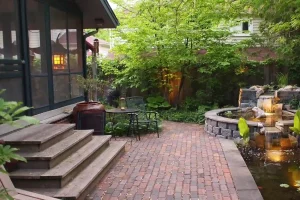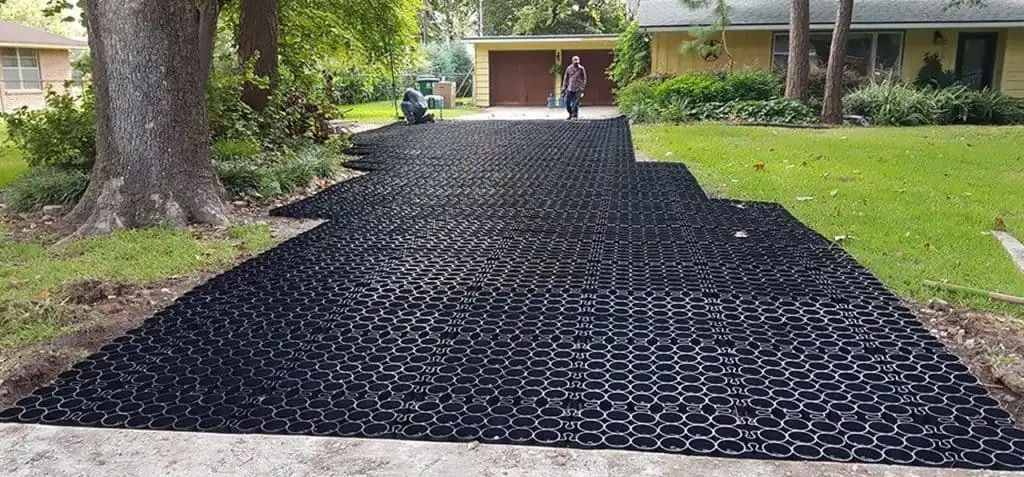In the scope of restaurant design, the selection of outdoor paving materials plays a vital role in shaping the ambiance and functionality of the space. Exploring alternative materials for outdoor paving like permeable pavers, recycled glass, stamped concrete, or rubber pavers offers a world of benefits beyond aesthetics. By delving into these alternatives, restaurants can elevate outdoor dining experiences to new heights.
Key Takeaways
- Alternative materials offer unique textures, colors, and designs enhancing the restaurant’s aesthetic appeal.
- Using eco-friendly materials ensures sustainability and reduces environmental impact.
- Innovative materials provide enhanced durability, reducing maintenance costs in the long term.
- Incorporating permeable pavers allows for better water drainage, improving outdoor spaces.
- Implementing recycled materials promotes eco-friendliness and reflects a commitment to sustainability.
Challenges in Traditional Paving Methods
When it comes to outdoor paving in restaurant designs, traditional methods often present challenges that can hinder both aesthetic appeal and functionality. Issues such as cracking, staining, and difficulty in maintenance can detract from the overall ambiance of the space. Additionally, traditional materials may lack the durability required to withstand heavy foot traffic and varying weather conditions, leading to frequent repairs and replacements.
Benefits of Exploring Alternative Materials
Exploring alternative materials for outdoor paving in restaurant designs reveals a world of innovative solutions that can revolutionize the aesthetics and functionality of outdoor spaces. These materials offer unique textures, colors, and designs, allowing restaurant owners to create distinctive atmospheres that resonate with their brand identity. Additionally, alternative materials often provide enhanced durability, sustainability, and cost-effectiveness, making them a practical choice for outdoor paving projects.
Popular Alternative Materials for Outdoor Paving
A diverse array of innovative materials has gained popularity for outdoor paving in restaurant designs, offering unique aesthetic and functional benefits.
- Permeable Pavers: Allow water to seep through, reducing runoff.
- Recycled Glass: Adds a colorful and eco-friendly touch.
- Stamped Concrete: Mimics the look of natural stone or wood.
- Rubber Pavers: Provide a cushioned surface for outdoor seating areas.
Design Considerations for Restaurant Outdoor Spaces
What key factors should restaurateurs prioritize when designing outdoor spaces for their restaurants? Restaurateurs should consider the overall ambiance, seating capacity, and functionality of the outdoor space. Factors such as weather-resilient materials, comfortable seating arrangements, and adequate lighting are essential. Additionally, incorporating greenery, creating a cozy atmosphere, and ensuring easy access for patrons with disabilities are vital design considerations for a welcoming and inclusive outdoor dining experience.
Implementing Alternative Materials in Restaurant Paving
When considering the design and construction of outdoor restaurant spaces, the incorporation of alternative materials in paving offers a unique opportunity to enhance aesthetics, durability, and sustainability.
- Selection of eco-friendly materials
- Implementation of permeable pavers for better drainage
- Utilization of recycled materials for a sustainable approach
- Introduction of unique textures and patterns to create a visually appealing outdoor dining environment

Frequently Asked Questions
Can Alternative Materials for Outdoor Paving Be as Durable as Traditional Options?
Alternative materials for outdoor paving can indeed be as durable as traditional options. Through innovative technologies and material advancements, alternatives like concrete pavers, composite decking, and natural stone can offer comparable durability while providing unique design opportunities for restaurant outdoor spaces.
Are There Eco-Friendly Alternative Materials Available for Outdoor Paving?
Eco-friendly alternative materials for outdoor paving are increasingly available, catering to environmentally conscious design needs. These options include recycled materials, permeable pavers, and natural stones that offer both sustainability and durability, making them ideal choices for restaurant outdoor spaces.
How Do Alternative Materials for Outdoor Paving Compare in Terms of Cost?
When comparing alternative materials for outdoor paving regarding cost, factors such as initial investment, maintenance expenses, and longevity must be considered. While some alternatives may have higher upfront costs, they often offer significant long-term savings.
Can Alternative Materials for Outdoor Paving Be Customized to Match Restaurant Aesthetics?
Alternative materials for outdoor paving can indeed be customized to match restaurant aesthetics. From color variations to unique textures, these materials offer a range of options to create a cohesive and visually appealing design that complements the overall restaurant ambiance.
What Maintenance Is Required for Outdoor Paving Using Alternative Materials?
Regular maintenance for outdoor paving using alternative materials is essential for longevity and aesthetics. Cleaning with mild detergent, periodic sealing, and addressing cracks promptly are vital. Following manufacturer guidelines guarantees durability and preserves the desired appearance.
Conclusion
To sum up, the utilization of alternative materials for outdoor paving in restaurant designs offers a multitude of benefits, including enhanced aesthetics, durability, and sustainability. By exploring options such as permeable pavers, recycled glass, stamped concrete, and rubber pavers, restaurants can create unique outdoor spaces that reflect their brand identity while also contributing to a more eco-friendly environment. Consideration of design elements and proper implementation of these materials can truly transform outdoor dining experiences for both customers and businesses alike.
You May Also Like To Read:


